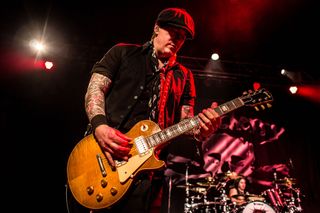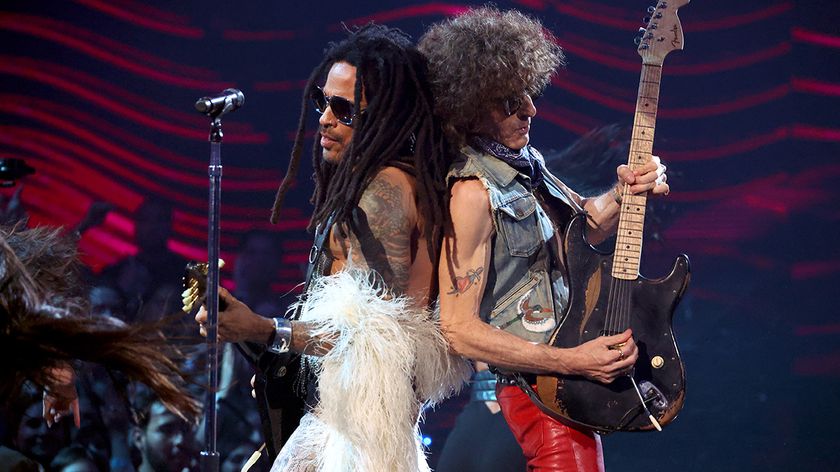Buckcherry Guitarist Keith Nelson Talks New EP, 'Fuck,' and His Gibson Collector’s Choice Les Paul

Never a band to play by the rules, Buckcherry have made a career out of pushing the boundaries — and buttons — of conventional rock while doing things their own way. It’s a strategy that has paid off with successful studio albums and singles over the last decade.
Buckcherry’s boldest and perhaps most controversial release to date might be Fuck, a new EP that unapologetically rattles the speakers as much as it will the censors.
The new EP, which will be released August 19, consists of six hook-laden tracks that feature guitarist Keith Nelson’s gritty riffs and vocalist Josh Todd’s sharp-tongued lyrics — including an unconventional yet tasty spin on Icona Pop’s hit song “I Love It," which the band has (naturally) renamed “Say Fuck It."
Buckcherry — Josh Todd (lead vocals), Keith Nelson (lead guitar), Stevie D. (rhythm guitar), Xavier Muriel (drums) and Kelly Lemieux (bass) — will soon team up with Godsmack, Seether and Skillet for this year’s Uproar Festival, which kicks off August 15 in Detroit, Michigan.
Meanwhile, Nelson has contributed “Louis,” one of his original 1959 Les Pauls, to the Gibson Custom Shop, where the staff has painstakingly analyzed every detail of the guitar's look, sound and wear to create a near-perfect replica for Collector's Choice #17. You can see a photo of Gibson's version of the guitar in the gallery below.
We recently caught up with Nelson to discuss the new EP and the process behind the making of his “new” Les Paul.
GUITAR WORLD: How does a project like Fuck begin?
Get The Pick Newsletter
All the latest guitar news, interviews, lessons, reviews, deals and more, direct to your inbox!
Even before our last record [Confessions], we had been toying around with the idea of doing an EP. It just kept creeping back, and this was finally the right time to do it. The concept was pretty straightforward. It started out with just a bunch of guys sitting on the tour bus saying, "Hey, wouldn't it be cool to do an album called Fuck and have every song on the album have ‘fuck’ in it?” [laughs]. Then after all of the laughter died down, we just said, "Yea, why not? Let's do it!"
How would you describe the sound of the EP?
It’s raw, guitar-driven rock and roll. We recorded most of it live to tape in my living room studio, so it’s very analog. All of these songs were written with the five of us standing around in a circle looking at each other, and I really wanted the recordings to convey that live-sounding vibe.
Can you tell me a little about the writing process?
After we had finished working on Confessions, I was still writing and collecting ideas. Then as the tour began to wind down, I started demoing up those ideas and gave them to Josh. Whenever we found ourselves having a few days off, we would all get together in a room and work out the songs. Lyrically, the responsibility for injecting "fuck" into every song came down to Josh. And, of course, he was up to the task! [laughs].
What made you decide to do a take on Icona Pop’s “I Love It”?
That was Josh’s idea and was actually the first song we did. Josh listens to a lot of pop radio and when he heard that song, he said "Man, we could really put our own spin on that thing!” He then put it to me to make it sound more like us. So I made it a bit more exciting for guitar players.
What can you tell me about the song “The Motherfucker”?
That one is straight-up, vintage Buckcherry. As a guitar player, it's a riff in "A." It happened more out of a jam. Once Josh started singing, we all just started jamming on it.
How did your recent relationship with Gibson come about?
Gibson’s been doing what's known as a Collector's Choice Series. It’s where they find the owner of an original 1959 Les Paul and then go to great lengths to recreate the guitar. I'm fortunate enough to be the owner and player of one of those guitars, so when my name came up, Gibson asked me if they could do it. I supplied my guitar, and they put it through a series of intensive scannings and 3D computer imaging. Basically, they made a replica of the real thing. It's crazy how accurate they got most of it.
What first attracted you to vintage guitars?
From the moment I started playing guitar, I’ve known that used ones were always less expensive than the new ones. But one day, I happened across a music store where the guy behind the counter was telling me all about how much better the older guitars sounded. Then I started looking around at all of my heroes — Jimmy Page, Paul Kossoff and Joe Perry. All of them were playing the old ones. I got the bug early on and have been collecting for more than 20 years.
At one point, I traded the majority of my collection for my first real 1959 Sunburst Les Paul. Then once I got that first one, I had to find one that was a little bit better. Eventually, I found the one that was perfect for me. I've had the guitar for a number of years now. It's called "Louis," and it's the one Gibson recreated.
In your opinion, what makes vintage instruments so much better?
“Better” is in the eye of the beholder but for me, there’s something magical going on with the age of the wood, the magnets, the wires and the finish. All of that goes together in a way that you really can't explain. When you're got it in your hands, you just know it. I still take Louis on the road with me and play him every night. I can actually play the entire set with it and it will not go out of tune. It's crazy how great that guitar is.
Besides Louis, what else is in your live setup?
I've got a few other vintage guitars out here with me now. I've got a 1957 Les Paul Junior that I use for all of the open-tuning stuff I do. I’ve also got a '54 Jeff Beck Les Paul Oxblood re-issue from Gibson, which is another phenomenal guitar. Amp-wise, I'm using a 1971 50-watt Marshall. I use the newer Marshall stuff when we travel abroad, but here in North America, I'm driving around with a couple of old heads and guitars. You know, just some old junk! [laughs].
Growing up, what inspired you to start playing?
I started out as a drummer and around age 17 made the switch to guitar. I got a little bit of a late start, but my original goal was to play guitar to write songs.
Speaking of songs, can you tell me the origin of “Crazy Bitch”?
Writing "Crazy Bitch" was the best five minutes of my life [laughs]. I remember Josh called me up one day and said, "Hey, I've got this song idea!” So he sings the chorus to me and says, "It just needs to have some funky music with some space in it. Do your thing!" So I sat down with a drum machine and a four-track recorder and came up with the music. The next day, Josh came in and I said, "Sing it over this!" He listened to what I wrote and said, "That's fucking awesome!" Then he sang the lyrics on the spot. Literally, it took five minutes. You can't plan for stuff like that. It just kind of happens — and I'm glad it did.
For more about Buckcherry, visit buckcherry.com and follow them on Facebook.
For more about Gibson's Collector’s Choice #17 guitar, visit gibson.com.
James Wood is a writer, musician and self-proclaimed metalhead who maintains his own website, GoJimmyGo.net. His articles and interviews are written on a variety of topics with passion and humor. You can follow him on Twitter @JimEWood.




James is a guitarist and freelance writer who's interviewed some of the biggest names in music. He is the author of four books and his writing credits include work for Guitar World, AXS and Yahoo! as well as for his hometown newspaper where he writes on a variety of topics with both passion and humor. As a guitarist, he's performed everywhere from local bars and nightclubs to some of the biggest stages in front of thousands of music fans.

“We had 15 minutes left, and it was time to go… I just started playing that riff. Then Lenny goes, ‘Whoa, what’s that?’” Lenny Kravitz guitarist Craig Ross reveals the serendipitous roots of a Kravitz classic

“The concept of the guitar duel at the end was just appalling”: Crossroads is an essential piece of '80s guitar lore, but not every guitar legend was a fan of the film








